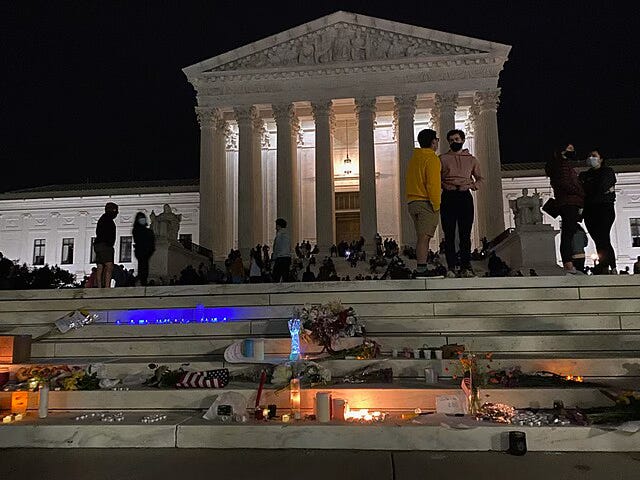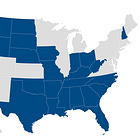The Court Got Your Anti-Abortion Bullsh*t In My Trans Care
Two bad tastes that taste like shit.

On Wednesday, the US Supreme Court handed down its decision in US v Skrmetti, a case about the extent to which the Equal Protection Clause of the 14th Amendment restricts states’ ability to target trans people with legislation. At issue was Tennessee’s SB1, which bans any drug or medical procedure for the purpose of “enabling a minor to identify with, or live as, a purported identity inconsistent with the minor's sex” or “treating purported discomfort or distress from a discordance between the minor's sex and asserted identity.” The specific question was ultimately pretty simple: Does the Constitution permit any odd excuse for targeting trans kids’ medical care? Or does a state have to justify those laws with good reasons?
The story starts a good, long time ago, with a case in which a state workers’ insurance board in California paid out benefits if a person was medically unable to work for most any reason, but not all reasons. The exception came before the court in Geduldig v. Aiello one year after Roe v. Wade established the right to abortion, and that exception was the inability to work related to pregnancy.
Sex discrimination analysis at the all-male Supreme Court of 1974 was, shall we say, in its infancy. Though a couple of key cases (one in 1971 and one in 1973) had established that equal protection does require invalidating some laws distinguishing persons based on sex, the Court was sometimes confusingly vague in its wording about what sex distinctions would and wouldn’t be tolerated. It would not be until 1976 that the Court finally established a more general test that is still in use today: intermediate scrutiny, not as rigid as the strict scrutiny applied in race discrimination cases, but not as lax as the rational basis test applied to most laws where discrimination would not normally be suspected.
Without that intermediate scrutiny test established, Geduldig rather famously went off the rails. Discrimination on the basis of pregnancy, the Court held, couldn’t be discrimination on the basis of sex. Both the outcome and the reasoning have been rather famously mocked, but in recent years it has been treated as good law by SCOTUS conservatives for its usefulness in one particular area: anti-abortion law.
Struggling to decide Geduldig, the Court reasoned that since not all women get pregnant, the benefit fund was distinguishing on the basis of a diagnosis or medical condition, but not on sex. When the court struck down Roe v. Wade and Planned Parenthood v. Casey in Dobbs v. Jackson Women’s Health, Justice Samuel Alito wrote,
The regulation of a medical procedure that only one sex can undergo does not trigger heightened constitutional scrutiny unless the regulation is a “mere pretex[t] designed to effect an invidious discrimination against members of one sex or the other.”
This special carve-out for the province of medicine was resurrected solely to be weaponized against abortion (this use was discussed in conservative circles for years before it was put to use in Dobbs), but having given it new life, Chief Justice John Roberts found it the perfect tool to use against trans care in Skrmetti. SB1 did not classify according to sex or trans status, he argued, but only according to two factors: age and diagnosis.
SB1 divides minors into two groups: those who might seek puberty blockers or hormones to treat the excluded diagnoses, and those who might seek puberty blockers or hormones to treat other conditions.
Using this one weird trick, Roberts argued that while only trans kids would seek care for the excluded diagnoses, both trans and non-trans kids might not seek care and both trans and non-trans kids might seek care for other diagnoses. So while only trans kids would be affected by the ban, anyone could benefit from the exceptions to the ban. Obviously this is non-discriminatory, says wise Roberts, because the diagnosis does all the work and no reference to sex exists in the law.
After being shoved unwilling into boxes for all their young lives, Roberts crammed Tennessee’s trans youth into yet another: a legal box crafted solely as a pregnancy-exception to the Equal Protection Clause. It’s a constitutional Black Site for the combined torture of children who don’t submit to gender norms and people seeking abortion, and it’s yet another reason why reproductive rights advocates and trans advocates must fight the Right together.
As bad as this is, Chase Strangio, the ACLU lawyer who argued the case for the families who originally brought the suit, thinks it could have been much worse. By using anti-abortion reasoning to decide Skrmetti, the court avoided stating explicitly that the intermediate scrutiny which protects cis women and cis men does not protect trans people. Since the Ninth and Fourth Circuit Courts of Appeal have already ruled that it does, those protections remain intact outside of the minor and unimportant area of access to medical care in the far West plus Maryland, the Carolinas, and the Virginias.
As for Skrmetti affecting equal protection claims for cis folks? Well, it seems to pose no threat of its own, for now, but working to hurt trans kids here, the revived-but-questionably-healthy Geduldig we saw in Dobbs looks hale and hearty now. And that bodes ill for anyone who is or might become pregnant anytime soon.
PREVIOUSLY ON WONKETTE!
Your friendly, neighborhood Crip Dyke also writes Pervert Justice!
Crip Dyke is by far the heppest cat on BlueSky. She probably has too many followers to net you hipster cred if you join them now.







best gallows humour moment of the day comes from Stone Cold Jane Austen:
"It’s a good thing Congress isn’t alive to see this."
https://bsky.app/profile/abbyhiggs.bsky.social/post/3ls5tri363c2v
I wrote this below for Our Man in Redneckistan, asking me to comment on Moira Donegal's piece on Skrmetti in The Guardian. Then I realized you won't need to have read that to appreciate this comment, and the conversation had already passed my convo with OMIR, so it might be useful to link you good folks to something that compliments the main article you just read.
https://www.wonkette.com/p/the-court-got-your-anti-abortion/comment/128092802